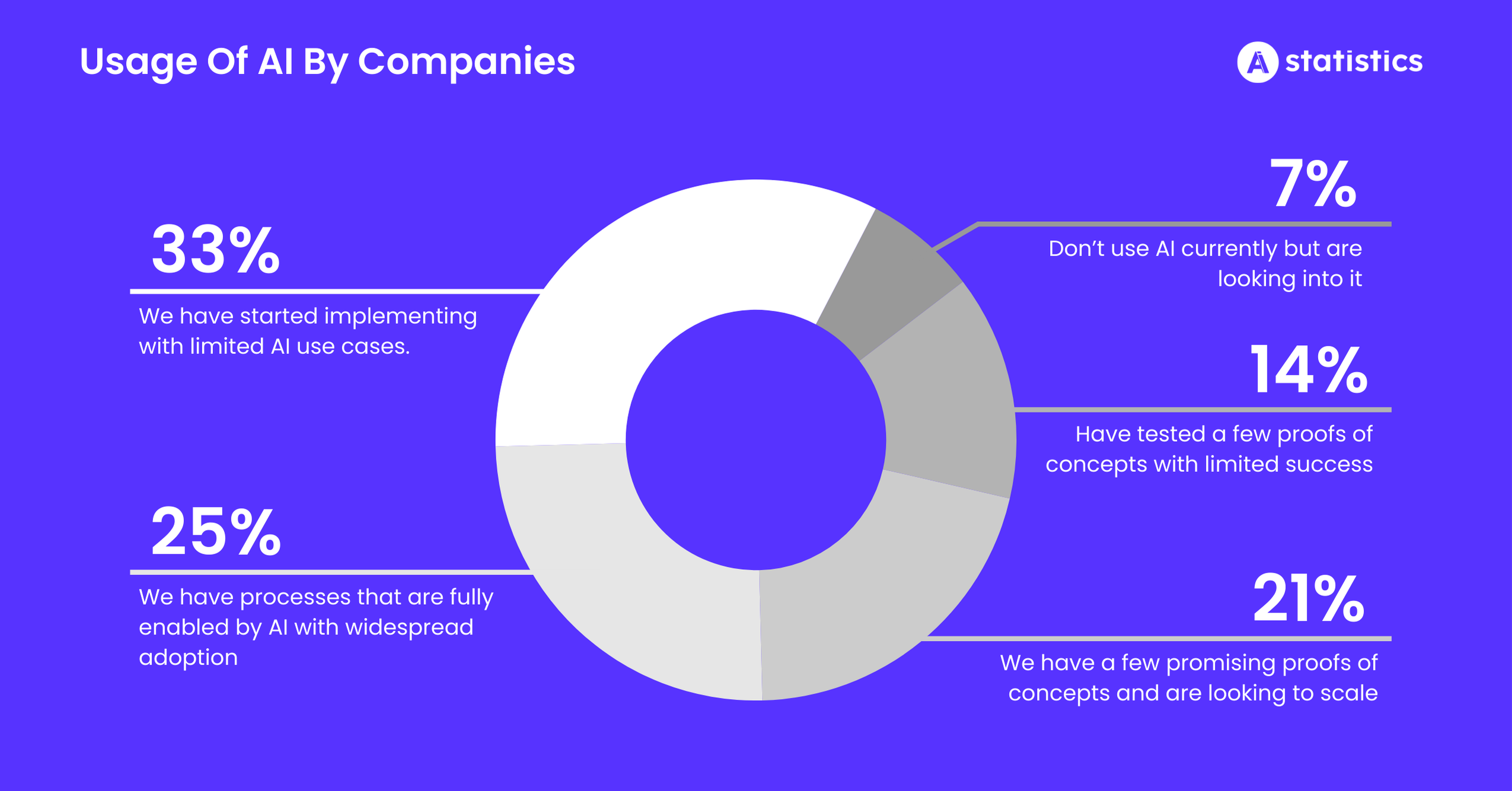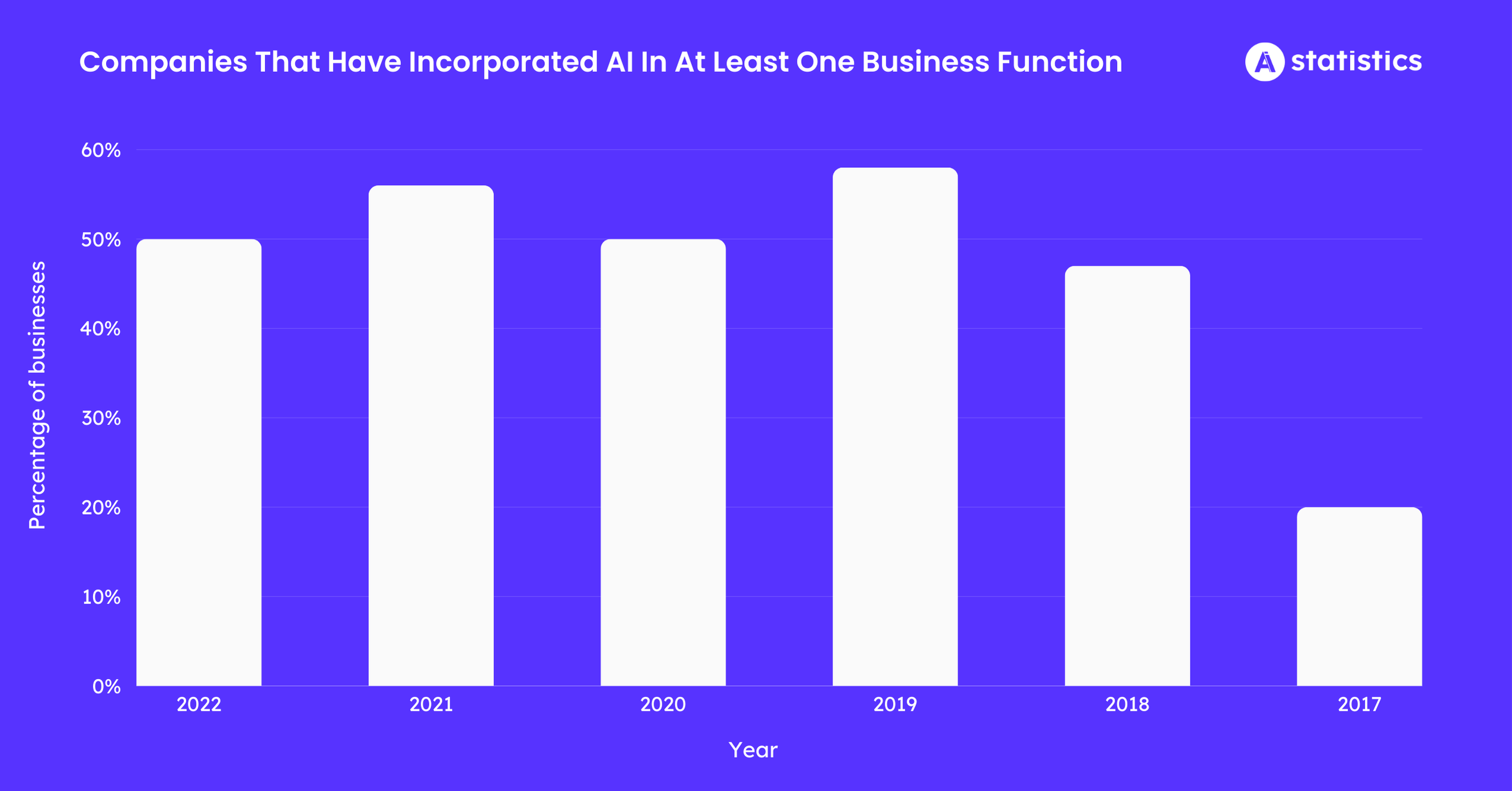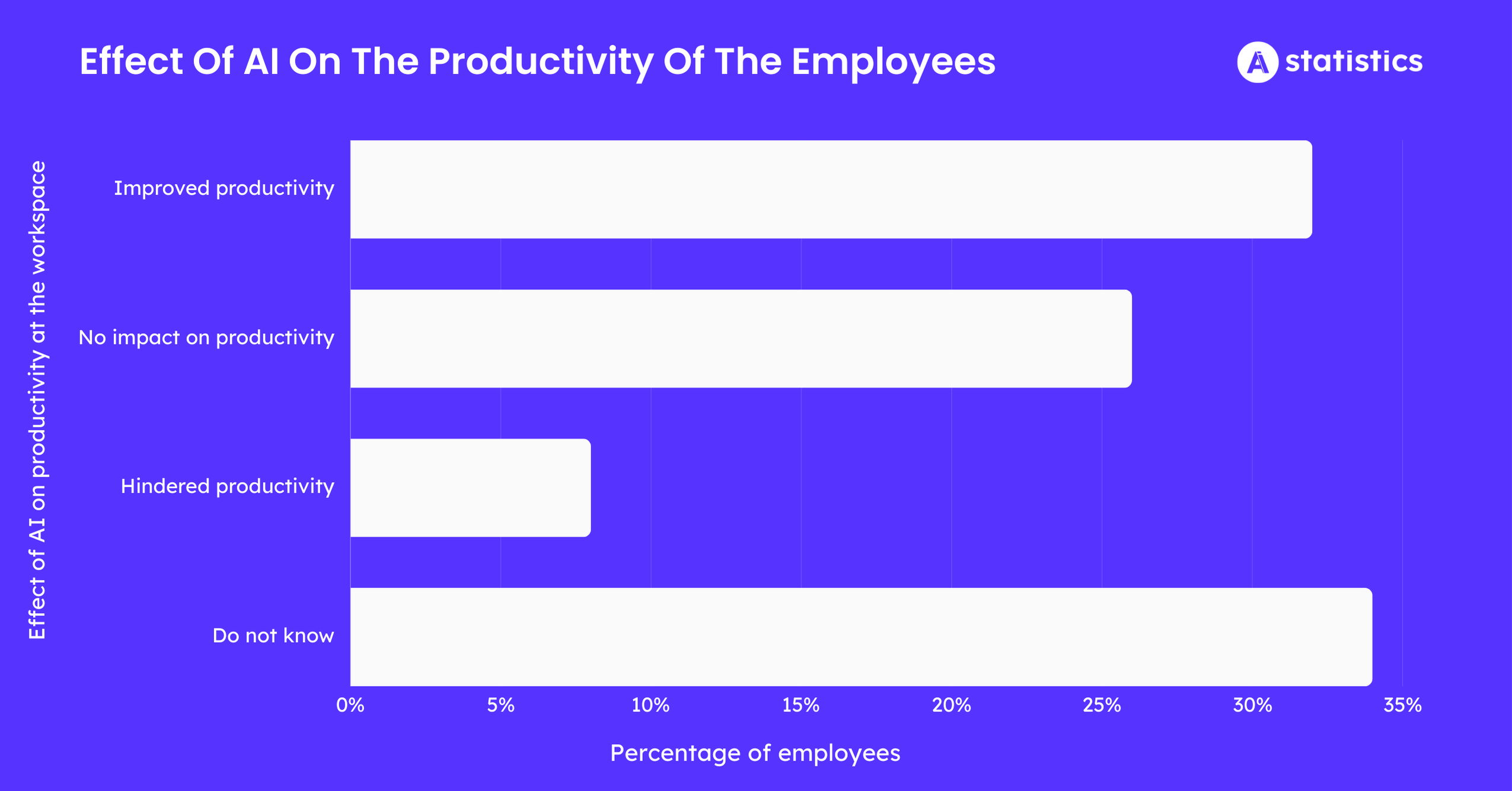AI has rapidly transformed the workspace landscape over the past few years and is estimated to bring more changes in the upcoming decade. By automating repetitive tasks, AI has the potential to boost efficiency and productivity at work.
As a result, 83% of business executives consider AI a priority for their business. Besides, nearly 9 in 10 global organizations believe that adopting AI in their workplace will provide them an edge over their competitors.
Let’s take a closer look at the facts and figures related to the adoption of AI in the workspace and its effect on businesses and organizations worldwide.
Ai In The Workplace Statistics 2026: Top Picks
- 83% of companies have adopted the use of AI at their workplace.
- 19% of employees in the United States were most exposed to AI at their workplace.
- 67% of IT leaders believe that AI may help improve employee efficiency.
- AI is anticipated to create an additional GDP of $13 trillion by 2030.
- AI is likely to create 133 million new jobs by 2026.
Ai In The Workplace Statistics: In-Depth
- 83% of the companies use AI in their businesses.
Over four in five companies stated that AI adoption is a top priority in their business strategy. Automated emails and chatbots are the most common uses of AI in business communication.
Besides, nearly a third of the companies have started implementing AI in their businesses with limited use cases.

The following table displays companies’ usage of AI.
| Usage of AI By Companies | Percentage Of Companies |
|---|---|
| Don’t use AI currently but are looking into it | 7% |
| Have tested a few proofs of concepts with limited success | 14% |
| We have a few promising proofs of concepts and are looking to scale | 21% |
| We have processes that are fully enabled by AI with widespread adoption | 25% |
| We have started implementing with limited AI use cases. | 33% |
Source: Forbes.
- 77% of the companies that are using AI are exploring its usage.
35% of companies worldwide use AI in their businesses, while 42% have reported that they are exploring the use of AI in their company.
More than 50% of companies plan to incorporate AI into their businesses. Comparatively, just 20% of the companies incorporated AI into their product offerings and businesses.

Here is a table displaying the percentage of companies that have incorporated AI in at least one business function over the years.
| Year | Percentage Of Businesses |
|---|---|
| 2022 | 50% |
| 2021 | 56% |
| 2020 | 50% |
| 2019 | 58% |
| 2018 | 47% |
| 2017 | 20% |
Source: Exploding Topics.
- 19% of American employees were most exposed to AI at their workplace.
Jobs that have a high level of exposure to AI tend to be in paying fields.
Besides, 23% of the workers had jobs that were the least exposed to AI. Meanwhile, 6 in 10 workers are more likely to have a varying level of exposure to AI.
Source: Pew Research.
- 17% of the Men and 21% of the Women were most exposed to AI at their workplace.
At the same time, 24% of Asians were most exposed to AI at their job, and the lowest share of Hispanics were exposed to the most AI at their workplace.
Besides, 27% of the employees who have completed their bachelor’s were most exposed to AI, while just a 3% share of the workers who have not completed high school were exposed to AI.
The following table displays the percentage of American workers who are most exposed to AI at their workplace by demographics.
| Demographics | Percentage Of American Workers |
|---|---|
| Men | 17% |
| Women | 21% |
| White | 20% |
| Black | 15% |
| Hispanic | 13% |
| Asian | 24% |
| Amer, Indian, or Pacific Islander o | 16% |
| other | 18% |
| Less than High School | 3% |
| High School Graduate | 12% |
| Some college | 19% |
| Bachelors | 27% |
Source: Pew Research
- 67% of IT leaders stated that AI may help in improving employee efficiency.
A survey of 2,500 global IT leaders brought into the limelight that most leaders regard AI positively, although over half of them have not personally used it.
The survey further revealed that over two-thirds of IT leaders believed that AI can increase their employees’ work efficiency.
In addition, 68% of IT leaders believed that AI could help the models work more efficiently, and 7 in 10 IT leaders believed that AI could improve the automated detection capabilities of cyber security threats.
Source: ZDNet.
- AI is anticipated to create an additional GDP of $13 trillion by 2030.
As a result, the global GDP will be boosted by 1.2% in a year.
Source: McKinsey.
- Half of the employees will need to reskill to work with AI by 2026.
With the rapid adoption of AI in workspaces, organizations will have to reskill half of their employees by 2026.
According to a McKinsey survey, 44% of companies are likely to face skill gaps in the next five years.
Besides, 94% of the employees are more likely to stay with a company longer if it offers a reskilling opportunity.
- By 2026, AI is likely to create 133 million new jobs.
However, at the same time, AI is anticipated to replace 75 million jobs globally. As a result, there may be 58 million jobs gained worldwide by 2026.
The integration of AI into the workspace brings both opportunities and challenges. AI will transform job roles, requiring continuous skill adaptation.
Source: Weforum.
- By 2026, 95% of customer interactions will be powered by AI.
AI is becoming a vital part of businesses worldwide, and as a result, more and more consumers are interacting with AI through customer service calls and online chat forums or chatbots.
Source: AI Business
- 32% of the consumers stated that AI tools like ChatGPT, dall-E, etc have improved their productivity in the workspace.
On the other hand, 8% of the employees stated that the adoption of AI in their workplace has hindered their productivity.
Meanwhile, over one-fourth of the employees stated that they did not witness any change in their productivity with the adoption of AI.

The following table displays the effect of AI on the productivity of the employees.
| Effect Of AI On Productivity At The Workspace | Percentage Of Employees |
|---|---|
| Improved productivity | 32% |
| No impact on productivity | 26% |
| Hindered productivity | 8% |
| Do not know | 34% |
Source: Statista
Additional Statistics On AI In The Workplace
- Organizations that have integrated AI are five times more likely to make data-driven decisions.
- Almost 9 in 20 fastest-growing companies in the United States are working on the adoption of AI-driven technologies.
- The adoption of AI is more likely to boost productivity at the workplace by 40% by 2026.
- The healthcare sector is more likely to save $150 billion every year by 2026 due to the adoption of AI.
- 13 of 20 managers stated that they trust AI-powered systems more than their employees when making business decisions.
- According to two-thirds of companies, using AI in hiring has improved the quality of the candidates they hire.
- Over a third of organizations’ roles are more likely to be impacted by AI automation by 2030.
- 45% of the work activities can be automated with the help of AI technologies.
- 87% of the businesses that have adopted AI stated that they are considering using AI for sales forecasting and for improving the eCommerce experience.
- Over 6 in 10 employees stated that they are optimistic and excited about the integration of AI in their workplaces.
- Two-thirds of the CEOs stated that AI is likely to have a larger impact on the internet.
- 9 in 10 consumer queries can be resolved with the adoption of AI.
Source: WifiTalents
Explore More Like This:
Conclusion: AI Will Be Widely Adopted In Workplaces In The Upcoming Decade!
Currently, over 8 in 10 businesses have adopted AI in their workplace, and AI has become a priority in nearly a third of workplaces.
Besides, AI will likely create 133 million jobs and replace 75 million jobs by 2026. Plus, the adoption of AI in workspaces is expected to result in an additional GDP of $13 trillion by 2030.
Above all, most employees and employers are positive about adopting AI in their workplace, as it has boosted productivity and efficiency.